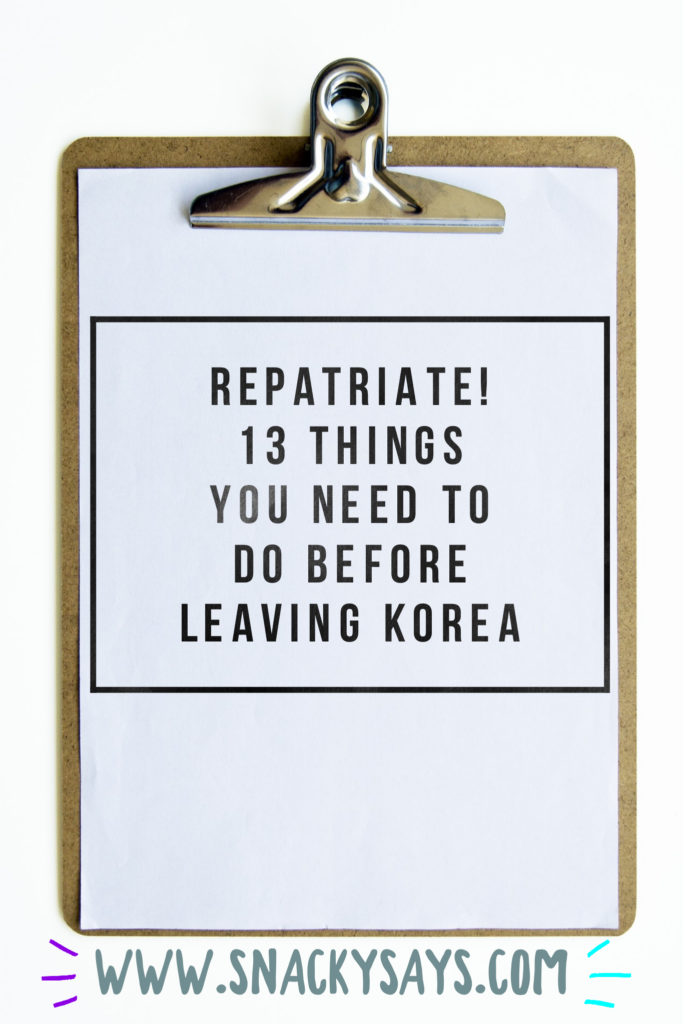
Whether you’ve taught in South Korea for a year or ten years, there is plenty to do before you leave. One thing, I wish that I had during this transition was a checklist. This checklist is prob not exhaustive but I hope it helps. FYI. I taught at public schools. Private schools/Hagwons might be different.
Not in order of importance:
1. Find out when your health insurance coverage ends. My insurance, oddly ended a few days before my contract did. I only found out at the doctor’s office. Luckily the last day of my insurance was also the day of my appointment.
2. Severance pay – Your school will pay you the equivalent of roughly one month’s salary per year that you worked. For simplicity’s sake, let’s say you taught for two years earning 2.5 million Korean won (roughly $2,200 US dollars) per month. Your severance pay would amount to approximately 5.0 million Korean won. If you have or have had more than one school during your time in Korea, this payment will come from your main school.
3. Pension Refund- If you’re a US citizen (or citizen of several other countries) and have paid into the pension for less than ten years you can get a “pension refund”. You will receive this refund within a few days to a couple of weeks after leaving South Korea. You must apply for your refund one month or less before your departure from Incheon International Airport. Among other things, you will have to visit your local pension office with a copy of your one-way ticket leaving Korea, your arc (Alien Registration Card), a copy of your bankbook and you must also bring your passport. Personally, I followed the guidelines at The Open Road Before Me blog including a very useful Pro Tip re: utilizing KEB Hana Bank Easy One accounts to receive my refund.
4. Contact your light, water, internet, gas, and cell phone companies to terminate service and pay any remaining bills. Also, be sure to pay your rent and any apartment maintenance fees. In my case, although my lease was up on the first of the month, I still owed one month’s rent. Why? Because I lived in my apartment for one full month before I paid rent for the first time. So, I was always one month behind. Finally, if you paid a housing deposit/key deposit be sure to get your money back!
5. Bank – Assess whether or not you want to close your bank account(s) or keep them open. Will you be traveling through or returning to Korea/Asia in the future? Do you have a credit card tied to your bank account(s)? Are there automatic payments linked to your Korean bank account or credit card? Etc.
6. Certified Letter of Employment (재직증명서). This is basically proof of employment. You made need to use this back at home. You should be able to get this with your co-teacher’s assistance from your Office of Education or from the Admin Office (행정실) at your school or schools. Which reminds me, you should receive a certificate of employment from every school that you’ve taught at during your time in Korea.
7. Exit Allowance – Your school will give you money for your flight out of Korea. At the time. of this writing that equals 1.3 million Korean won. (That amount may be different on your contract. Some contracts may be more or less or may provide you with a reimbursement for an airline ticket instead of a direct payment.)
8. Check your contract re: any bonuses that you may be owed. Such as renewal bonuses which in my experience have been 2.0 million Korean won per contract. In the past, we would get paid 2.0 million Korean won after renewing our contracts for another year. That was then changed so that we got 1.3 million Korean won at the start of the new contract and then the remaining 700,000 Korean won at the end of the new contract. So if you were leaving Korea, this year you would be owed 700,000 Korean won. Policies do change from year to year. Please check your contract regarding specific payouts amounts and time frames.
9. Reference Letters from co-teachers, other co-workers, principals, etc.
10. Check NEIS or other Human Resources software and print out the vacation and sick time that you’ve used. Make sure the information is correct so you can plan your remaining vacation days. It’s also a good idea to check to make sure all of your sick time (with and without doctor’s notes), vacation time, school holidays, business trips or activities outside of school (visits to the immigration office, meetings not on school property, overnight or weekend English camps, etc) have been documented properly. Also, remember what I said earlier, about health insurance, if you need any procedures done, now might be a good time to schedule them.
11. Annual Pay stub (근로소득 원천 징수 영수증) You may need this to file your taxes back home or just for your records. You can get this from your Admin Office (행정실).
12. File your Korean taxes – if you are a US citizen you are exempt for the first two years. But you will need to hand in the requisite documentation. If you’ve been in Korea for more than two years, you will have to file taxes. You can usually file your taxes with your school’s Admin Office. Though I have heard stories of teachers filing online or with the help of an Accountant. You will either get a refund or owe money.
13. Make a copy of your ARC (Alien Registration Card) . By now, you may know your ARC number by heart and of course your current home address. Will you remember in a couple of years when you need the address or need to know exactly how your name was listed? Probably but why chance it?
Social Suggestions:
- You may want to travel a bit in Asia post contract or during your final vacation days. Why not? It will probably be closer and more affordable than traveling from your home country.
- Schedule “see you later” meetups with your fav people and in your fav places. I for one will visit my fav museum one more time.
- Souvenirs for family and friends back home? Maybe. I’m bringing the best souvenir of all. Me! Haha.
Once again, the aforementioned isn’t exhaustive, still, I hope it will serve as a solid jumping-off point. My last bit of advice, as soon as you think you might be leaving Korea, start to put together your own checklist. Once you know for sure, ask your co-teachers or handler at your school to review it with you and add anything that’s missing. For instance, a goodbye dinner might be a tradition at your school. Or you might be asked to write a “farewell letter” to your students in the school newspaper or to help on-board your replacement, etc.
Did I forget anything? What would you add to this checklist for Native English Teachers leaving South Korea?? Please let me know in the comments!
Good luck and safe travels! Wishing you all the best in your post-South Korea life!
